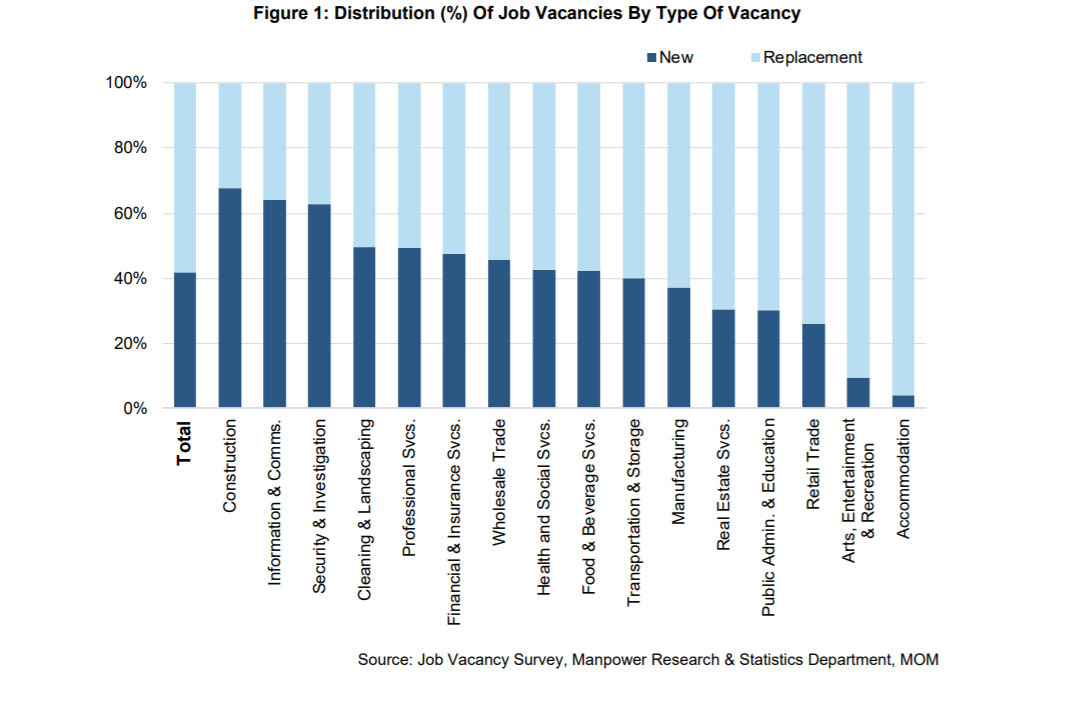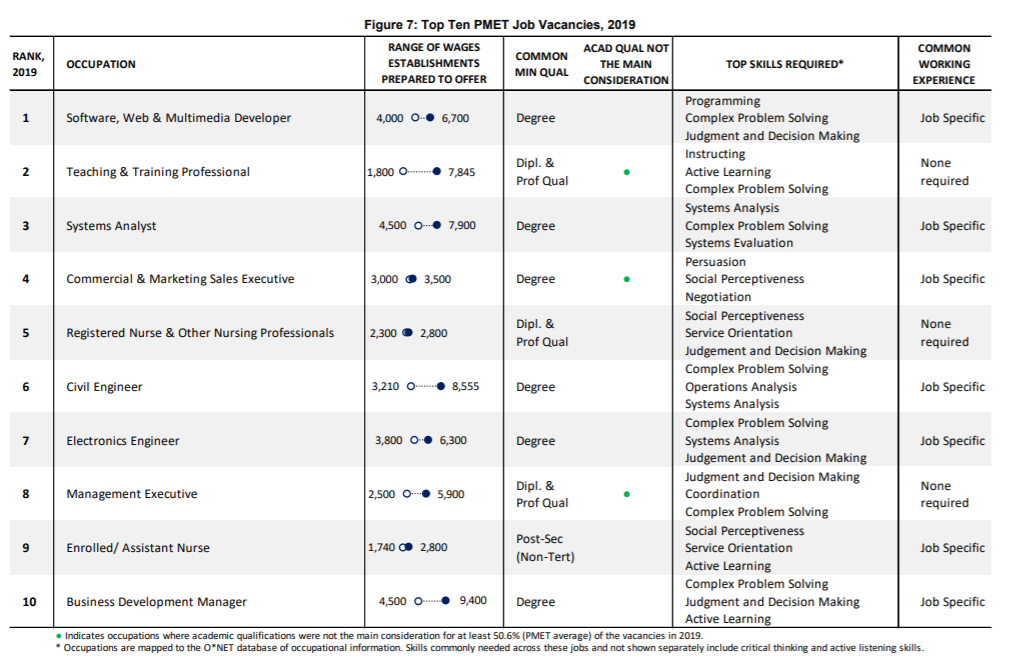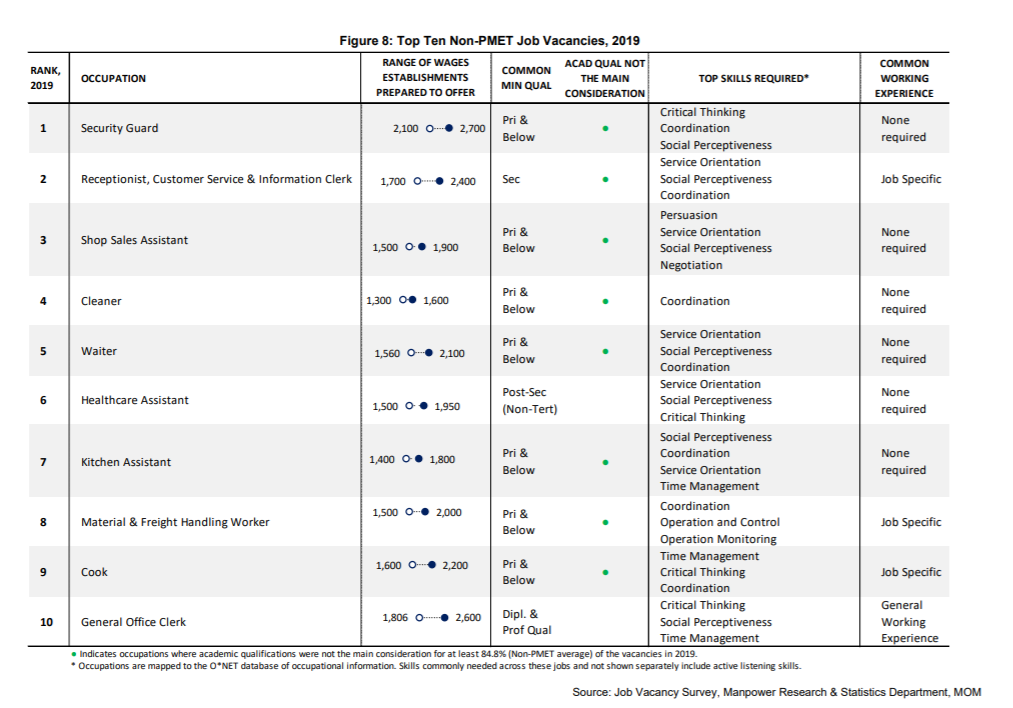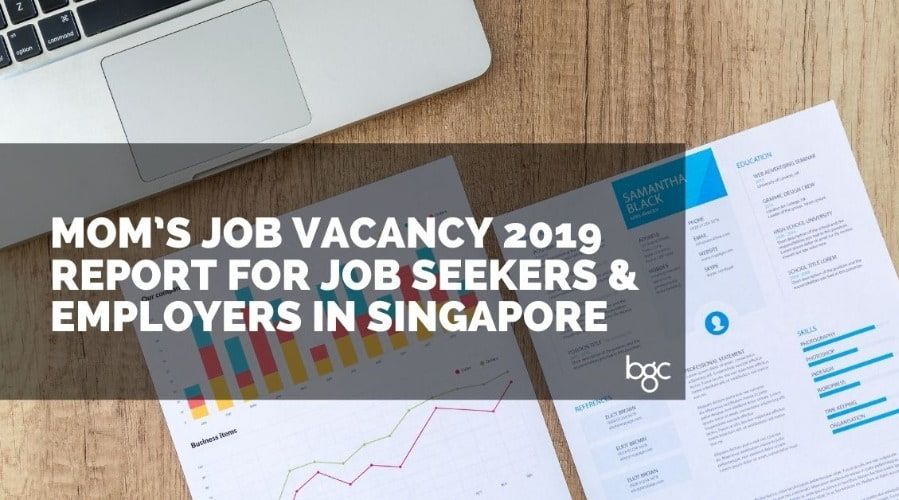TLDR? Here’s what we gathered from MOM’s Job Vacancy 2019 Report for Jobseekers & Employers
Are you an employer that has trouble hiring locals? Or are you a job seeker having difficulty landing a job after multiple interviews?
BGC Group absorbs breaks down the Job Vacancy Report published by the Ministry of Manpower provides insights to the reason for these job challenges and what you can do to solve them.
Industries that are the biggest sources of Singapore's jobs in 2019

The report identifies six industries that are likely to be the biggest source of jobs in the future. The six industries include construction, info communication and technology (ICT), professional services, financial & insurance services, wholesale trade and healthcare.
Of the 22,218 new jobs created from business formation and expansion, the average proportion of new job vacancies was 40% whereas for the six sectors, the average proportion of new job vacancies was around 50%.
Within these six industries, ICT holds the top spot of proportion of newly created job vacancies at about 60%. With many companies increasing their digital transformation efforts as well as the global fixation on technology, this should not come as a surprise.
While this is generally an optimistic sign for graduates with skills in the mentioned industries, it also means that organisations need to have competitive recruitment efforts to secure the best talent who are also highly demanded by peers.
Main reasons cited for why vacancies are unable to be filled by Singaporean locals
Why employers find it difficult to hire locals, explained:
One of most common reasons candidates listed for not accepting your job offer was because they found the pay unattractive. This was the response of 21% of candidates that rejected a professional, manager, executive & technician (PMET) job offer and 42% of candidates that were offered a non-PMET job.
Another common reason for rejecting offers across both PMET and non-PMET jobs was that candidates prefer not to work on public holidays and weekends. This was found in 14% of candidates offered a PMET job and a corresponding 34% of candidates offered a non-PMET job.
Specifically for non-PMET job offers, candidates seem to have issues with the proposed working conditions of the job. 34% of candidates rejected job offers because they preferred not to do shift work and 24% reported that they did not find the working environment conducive.
This is a timely reminder for employers to constantly review their job offers in line to the market, specifically in terms of compensation and benefits. This is more so for employers holding non-PMET job vacancies where most complaints surround the issue of perceived poor work life balance and working conditions.
Why candidates may find it difficult be considered for job vacancies, explained:
Within PMET jobs, 40% of employers had trouble filling vacancies due to candidates lacking specialised skills they were looking for. This was followed by 28% of employers citing that candidates did not have the working experience required.
Based on this survey, in order for candidates to increase their employability, they should focus on researching and acquiring the specific skills that employers are looking for. For example, fresh grads and even career switchers should consider partaking in internships and industrial experience during school breaks to increase their relevant working experience and to broaden their understanding of the needs of the industry they are looking to enter. Specialist courses, Career Trials, and project based work experience are also areas to consider adding to their working portfolio.
Top skills that makes job seekers more attractive to employers
Top skills needed for PMET jobs in Singapore

The top skill employers are looking for in PMET jobs is complex problem solving. Ironically, this term might seem obvious enough. However, complex problem solving is actually the combination of 2 sub-skills. Complex problem solving is really just 2 critical thinking skills. The first is the ability to understand complicated problems. For example, if a business is not generating the targeted revenue, candidates should be able to break this problem up to its subsidiaries such as is the cost of the product too high? Are the marketing channels not optimized? Then they must be able to develop solutions for each problem such as reducing production costs or optimizing marketing efforts.
Another commonly mentioned skill in PMET jobs is judgement and decision making. This pertains to the ability of candidates to make sound decisions based on the information they are given. Particularly, candidates need to possess good analytical skills to judge situations and their implications accurately. They must then prove that the decisions they make are in the best interest of meeting business objectives.
Top skills needed for Non-PMET jobs in Singapore

Within non-PMET jobs, employers are mostly looking for candidates that are service oriented. This should not come as a surprise considering the majority of non-PMET jobs are in the tertiary or service industry. Service orientation means candidates possess a “customer comes first” attitude, focusing on the needs of the client as the primary business objective.
In service industries, the skill of social perception is also highly regarded by employers. This is because social perception skills such as empathy are keys to high client satisfaction and retention in non-PMET jobs.
Both employers and candidates can gain valuable insights from this report. The report clearly highlights areas of improvements employers can focus on in order to attract more local candidates. Similarly, candidates can use the information from the report to upskill themselves to become more attractive to employers.
Wrapping up
With this, we hope this quick summary of the report comes in handy for job seekers looking to get hired, as well as employers looking to hire in Singapore!
Recommended Reads
How To: Job Search During the Pandemic for Singaporean Job Seekers
Reasons Why Singaporean Job Seekers Should Learn Programming
6 Important Tips on Engaging Talented Job Seekers in Singapore
